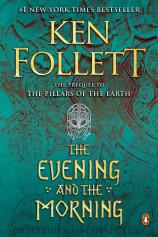The Evening and the Morning
Review
The Evening and the Morning
THE EVENING AND THE MORNING, the fourth installment in Ken Follett’s Kingsbridge series (THE PILLARS OF THE EARTH, WORLD WITHOUT END, A COLUMN OF FIRE), is nothing short of perfection. This is the trilogy’s prequel, and what makes it so special is Follett’s return to the Middle Ages. Readers are treated to rich character development and strong historical themes. Along the way, he lays out English political administration --- its structure and its limits --- and the role of the clergy. Of course, there is a love story, deceit, murder and many other compelling elements that he crafts into a page-turning tour de force.
As the story begins, Edgar and his shipbuilding family are tossed about by the social forces of the era. Compelled to flee their home and profession, they become farmers in a strange and insular little hamlet named Dreng’s Ferry. Quickly they find who wields the power and must choose to either acquiesce or fight.
"THE EVENING AND THE MORNING...is nothing short of perfection.... [T]here is a love story, deceit, murder and many other compelling elements that [Follett] crafts into a page-turning tour de force."
At the same time, a beautiful French noblewoman, Ragna, is wooed and wed by one of those men of power, Wilwulf (Wilf), whose family rules the region. Wilf is the ealdorman, his brother Wynstan the corrupt bishop, and his youngest brother Wigelm a brutish thane. Ragna soon learns that her love is misplaced, and she too must figure out how to survive amid treachery and deceit.
Finally, there is Aldred, a simple monk who loves books and is Wynstan’s foil, personifying the Christian virtues that the bishop lacks.
These three major characters emerge as the forces of good. Their courage in standing up to the brothers will cost them, but unlike so many others, the trio simply cannot ignore the price of letting them go unchallenged.
Whether it is the Viking raids, the nobility or the clergy, simple people like Edgar live precarious lives that can be uprooted in a moment. While English law is developing fast, enforcement depends on the enforcer and can be nonexistent. Here, Follett is at his best. Plot lines travel alternately from the bedroom to the battlefield, the alehouse to the cathedral, and from England to France. His characters are imperfect creatures struggling to survive in a place where dangers lurk regardless of one’s social stature. Ultimately, justice must prevail, but it remains to be seen at what cost.
A consummate novelist, Follett might just as easily be a historian. For this reason, read the book carefully. While the story will propel you along at high speed, take a moment and answer the questions that arise: What is a “hundred court?” A thane? A minster? Follett’s research is obvious, but it is his genius for weaving the story around the spine of this history that sets him apart. There is always a character or two in the series upon whom the advancement of civilization is imposed. Edgar is the historical hinge in this book. He has no familial connections to power. He can only call upon his powers of logic, skill and intelligence to combat the prevailing ignorance and superstition. He personifies progress and a new way. With like-minded allies, he pivots England ever so slowly toward a more enlightened future. By the end of the novel, not only has Edgar changed, but England has as well.
If you read multiple books at one time, finish them and savor THE EVENING AND THE MORNING all by itself. Transported by a master storyteller, you will slip away from 2020 and find yourself in the Middle Ages tasting the ale, fighting the hunger and living life on the razor’s edge.
Reviewed by John Vena on September 18, 2020
The Evening and the Morning
- Publication Date: June 29, 2021
- Genres: Fiction, Historical Fiction
- Paperback: 928 pages
- Publisher: Penguin Books
- ISBN-10: 0451478010
- ISBN-13: 9780451478016




